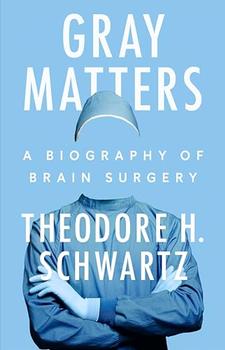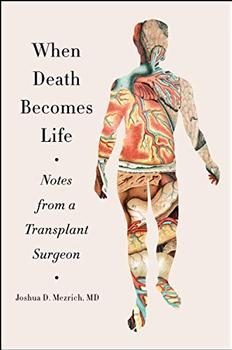
A Biography of Brain Surgery
by Theodore H. SchwartzA popular biography of brain surgery, by one of its preeminent practitioners.
We've all heard the phrase "it's not brain surgery." But what exactly is brain surgery? It's a profession that is barely a hundred years old and profoundly connects two human beings, but few know how it works, or its history. How did early neurosurgeons come to understand the human brain—an extraordinarily complex organ that controls everything we do, and yet at only three pounds is so fragile? And how did this incredibly challenging and lifesaving specialty emerge?
In this warm, rigorous, and deeply insightful book, Dr. Theodore H. Schwartz explores what it's like to hold the scalpel, wield the drill, extract a tumor, fix a bullet hole, and remove a blood clot—when every second can mean life or death. Drawing from the author's own cases, plus media, sports, and government archives, this seminal work delves into all the brain-related topics that have long-consumed public curiosity, like what really happened to JFK, President Biden's brain surgery, and the NFL's management of CTE. Dr. Schwartz also surveys the field's latest incredible advances and discusses the philosophical questions of the unity of the self and the existence of free will.
A neurosurgeon as well as a professor of neurosurgery at Weill Cornell Medicine, one of the busiest and most highly ranked neurosurgery centers in the world, Dr. Schwartz tells this story like no one else could. Told through anecdote and clear explanation, this is the ultimate cultural and scientific history of a literally mind-blowing human endeavor, one that cuts to the core of who we are.
In addition to the history of the neurosurgery, Schwartz examines cases of famous and not-so-famous individuals, exploring them in forensic detail and revealing little-publicized secrets about their treatments. He also addresses the philosophical implications of brain surgery, and closes with a discussion of new technologies, some of which may one day be implanted in the human brain. This may sound like a lot to cram into a single volume, but Schwartz covers all that ground with aplomb. His book is readable and informative while rarely seeming dense; it's as close as a nonfiction book about a detailed science can be to a page-turner...continued
Full Review
 (708 words)
(708 words)
(Reviewed by Kim Kovacs).
 Anna Lembke, MD, author of Dopamine Nation: Finding Balance in the Age of Indulgence
Gray Matters is a riveting journey through the intricacies and complexities of the human brain, a compelling read for anyone considering a career in medicine, or anyone simply curious about the work life of a brain surgeon. The fascinating stories of people undergoing brain surgery highlight the mix of human ingenuity and daring that have propelled the field.
Anna Lembke, MD, author of Dopamine Nation: Finding Balance in the Age of Indulgence
Gray Matters is a riveting journey through the intricacies and complexities of the human brain, a compelling read for anyone considering a career in medicine, or anyone simply curious about the work life of a brain surgeon. The fascinating stories of people undergoing brain surgery highlight the mix of human ingenuity and daring that have propelled the field. Ben Carson, founder and chairman of American Cornerstone Institute, emeritus professor of Neurosurgery at Johns Hopkins Medicine, and 17th Secretary of the United States Department of Housing and Urban Development
Whether you are interested in history, medicine or specifically neurosurgery, Gray Matters by Dr. Theodore Schwartz will not only satisfy your curiosity, it will entertain you with riveting accounts of life and death situations. The book is highly readable and very educational as well.
Ben Carson, founder and chairman of American Cornerstone Institute, emeritus professor of Neurosurgery at Johns Hopkins Medicine, and 17th Secretary of the United States Department of Housing and Urban Development
Whether you are interested in history, medicine or specifically neurosurgery, Gray Matters by Dr. Theodore Schwartz will not only satisfy your curiosity, it will entertain you with riveting accounts of life and death situations. The book is highly readable and very educational as well. Dana Suskind, pediatric surgeon and author of the New York Times bestseller Parent Nation and Thirty Million Words
Blending personal experiences from the operating room with neuroscience's historical roots and contemporary examples, Dr. Theodore H. Schwartz gives readers a captivating glimpse into the high-stakes, emotionally charged world of brain surgery. A riveting read that unveils the humanity, history, and science behind the scalpel.
Dana Suskind, pediatric surgeon and author of the New York Times bestseller Parent Nation and Thirty Million Words
Blending personal experiences from the operating room with neuroscience's historical roots and contemporary examples, Dr. Theodore H. Schwartz gives readers a captivating glimpse into the high-stakes, emotionally charged world of brain surgery. A riveting read that unveils the humanity, history, and science behind the scalpel. Dr. Sanjay Gupta, CNN Chief Medical Correspondent, and New York Times and #1 Wall Street Journal bestselling author of Keep Sharp: Build a Better Brain at Any Age
If you are at all curious about the brain or the surgeons who operate on it, Gray Matters is a must read and Dr. Theodore Schwartz is the perfect guide, a master brain surgeon and superbly talented writer. I have not read a better biography of our shared profession, and in Schwartz's talented hands, the most enigmatic 3 1/2 pounds of tissue in the known universe comes to light in remarkable and revelatory ways.
Dr. Sanjay Gupta, CNN Chief Medical Correspondent, and New York Times and #1 Wall Street Journal bestselling author of Keep Sharp: Build a Better Brain at Any Age
If you are at all curious about the brain or the surgeons who operate on it, Gray Matters is a must read and Dr. Theodore Schwartz is the perfect guide, a master brain surgeon and superbly talented writer. I have not read a better biography of our shared profession, and in Schwartz's talented hands, the most enigmatic 3 1/2 pounds of tissue in the known universe comes to light in remarkable and revelatory ways.In Theodore H. Schwartz's book, Gray Matters: A Biography of Brain Surgery, the author traces the history of neurosurgery. His account begins with the work of Dr. Harvey Cushing, whom he calls the "undisputed founding father of neurosurgery," in the late 19th/early 20th centuries. If one considers any deliberate operation on the brain to be "brain surgery," however, the art has actually been around for millennia.
Trepanation—the act of creating a hole in the skull for medical reasons—is considered one of the world's most ancient surgical techniques. It's been practiced since at least the Neolithic period (beginning 10,000 BCE) and fossil evidence of its use has been found in Europe, South America, Africa, and Asia. In many ...

If you liked Gray Matters, try these:

by Joshua D. Mezrich
Published 2020
A gifted surgeon illuminates one of the most profound, awe-inspiring, and deeply affecting achievements of modern day medicine - the movement of organs between bodies - in this exceptional work of death and life.

by Christian Donlan
Published 2018
In the vein of The Noonday Demon and When Breath Becomes Air, a father's gorgeous account of navigating his own neurological decline while watching in wonder as his young daughter's brain activity blossoms, a stunning examination of neurology, loss, and the meaning of life.




A million monkeys...
Click Here to find out who said this, as well as discovering other famous literary quotes!